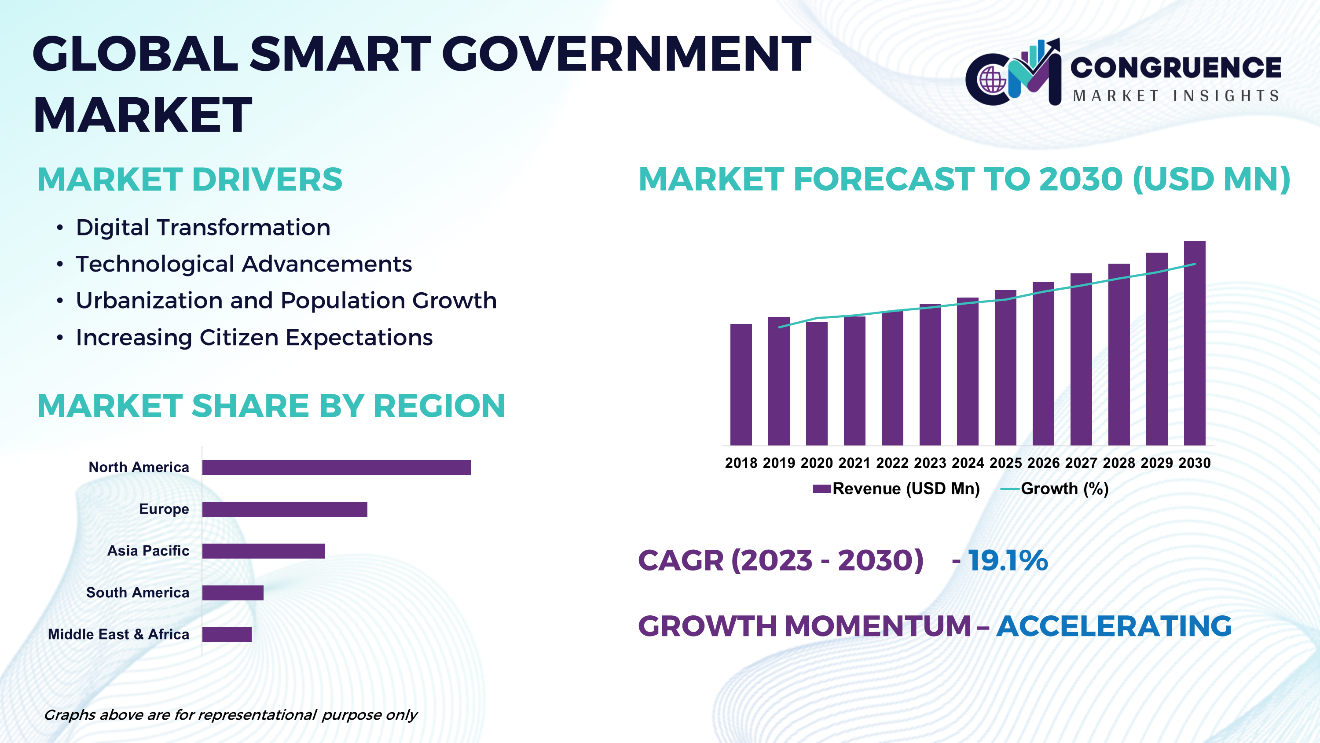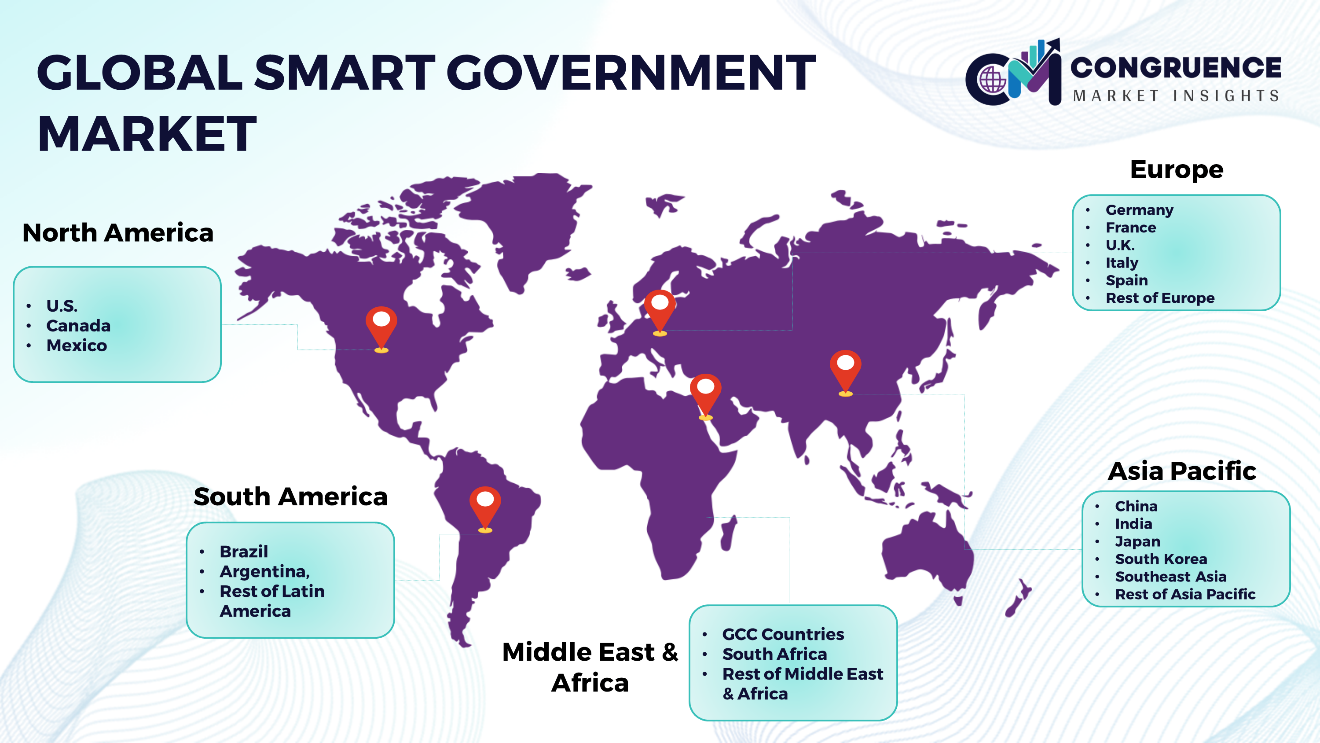Reports
The Global Smart Government Market is expected to expand at a CAGR of 19.1% between 2023 and 2030. The global smart government market is rapidly growing due to increased adoption of advanced technologies like AI, IoT, and blockchain. Governments worldwide leverage these solutions to enhance efficiency, transparency, and citizen engagement. Integration of 5G technology further accelerates this trend, enabling high-speed connectivity for real-time data exchange. Use cases include smart city initiatives, digital identity management, and public safety. Benefits encompass improved service delivery, cost reduction, data-driven decision-making, and enhanced citizen satisfaction. The market is marked by intense competition among leading solution providers, startups, and government agencies, all striving to harness digital technologies for sustainable development.

Smart Government Market Major Driving Forces
Digital Transformation: Governments worldwide are strategically embracing digital transformation initiatives to modernize administrative processes, improve service delivery mechanisms, and foster enhanced citizen engagement. This paradigm shift encompasses the integration of advanced technologies and digitized platforms across various government functions.
Technological Advancements: The rapid evolution and adoption of cutting-edge technologies such as artificial intelligence, Internet of Things (IoT), blockchain, and 5G networks are pivotal in catalyzing the development and implementation of innovative solutions within the smart government framework. These technologies empower governments to leverage data-driven insights and deploy efficient systems for better governance.
Urbanization and Population Growth: The phenomenon of rapid urbanization coupled with population growth presents significant challenges for government administrations in managing urban infrastructure and delivering essential services. Smart city solutions offer innovative approaches to address these challenges by leveraging technology to enhance urban planning, transportation, and public service delivery.
Increasing Citizen Expectations: Citizens are increasingly accustomed to seamless digital experiences in their interactions with both public and private sector entities. As a result, there is a heightened expectation for government services to be accessible, user-friendly, and efficient, necessitating the adoption of smart solutions to meet these evolving demands.
Smart Government Market Key Opportunities
Citizen-Centric Services: Governments have a significant opportunity to prioritize citizen-centric services by employing smart technologies to personalize interactions, streamline processes, and enhance overall satisfaction.
Smart Infrastructure Investment: Governments can seize the opportunity to invest in smart infrastructure projects that enhance connectivity, sustainability, and resilience. Initiatives such as smart grids, intelligent transportation systems, and digital healthcare infrastructure hold significant potential for advancement.
Cybersecurity Solutions: With the increasing digitization of government services, there is a growing need for robust cybersecurity solutions to safeguard sensitive data and protect against cyber threats. Developing and adopting advanced cybersecurity technologies present lucrative opportunities for solution providers.
Rural and Remote Access: Extending smart government initiatives to rural and remote areas presents an opportunity to bridge the digital divide and improve access to essential services. Tailored solutions addressing the unique needs and challenges of these communities can unlock significant value and impact.
Smart Governance Frameworks: Establishing comprehensive smart governance frameworks and standards offers an opportunity to promote interoperability, scalability, and sustainability across smart government initiatives. Standardized frameworks facilitate collaboration, integration, and efficiency.
Digital Identity Solutions: Governments can capitalize on the opportunity to develop secure and reliable digital identity solutions to streamline administrative processes, enhance security, and enable seamless access to government services. Digital identity solutions empower citizens while enhancing government efficiency.
Smart Government Market Key Trends
· Governments across the globe are actively engaged in digital transformation endeavors aimed at modernizing administrative processes, augmenting service delivery capabilities, and enhancing citizen engagement.
· The utilization of data analytics and artificial intelligence (AI) technologies is becoming increasingly prevalent among governmental entities, facilitating the derivation of actionable insights, process automation, and informed decision-making.
· The proliferation of Internet of Things (IoT) devices is witnessing a steady increase, empowering governments to access real-time data for optimized resource management, infrastructure monitoring, and service enhancement.
· Blockchain technology is being scrutinized by governments worldwide as a potential solution for enhancing transparency, bolstering security, and optimizing efficiency across various sectors, including electoral systems, identity management, and supply chain logistics.
· Momentum is building behind smart city initiatives, with governments directing investments towards technology-driven solutions tailored to address urban planning, transportation optimization, energy efficiency, and citizen-centric services.
· Heightened attention is being directed towards cybersecurity measures amidst the escalating digitization of governmental operations, with a primary focus on safeguarding sensitive data and critical infrastructure from cyber threats.
· Governments are actively embracing open data initiatives with the aim of fostering transparency, stimulating innovation, and promoting collaborative efforts amongst stakeholders.
· Significant emphasis is being placed on the development of digital platforms and mobile applications as tools to enhance citizen engagement, communication channels, and participatory decision-making processes.

Market Competition Landscape
The market competition landscape in the smart government sector is characterized by intense rivalry among leading solution providers, innovative startups, and government agencies. Key factors driving competition include technological innovation, service quality, pricing strategies, and market reach. Companies vie for market share by offering comprehensive solutions tailored to meet the diverse needs of governments worldwide.
Key players in the global Smart Government market implement various organic and inorganic strategies to strengthen and improve their market positioning. Prominent players in the market include:
· Oracle
· SAP SE
· Amazon Web Services, Inc.
· Dassault Systèmes
· Cisco Systems, Inc.
· Microsoft
· IBM Corporation
· Huawei Technologies Co., Ltd.
· Accenture
· Capgemini
· Hewlett Packard Enterprise Development LP
· Adobe
· Salesforce, Inc.
· (VMware) Broadcom Inc.
· Siemens
· NEC Corporation
· Dell Inc.
· Thales
· Palantir Technologies Inc.
· Splunk Inc.
|
Report Attribute/Metric |
Details |
|
Base Year |
2022 |
|
Forecast Period |
2023 – 2030 |
|
Historical Data |
2018 to 2022 |
|
Forecast Unit |
Value (US$ Mn) |
|
Key Report Deliverable |
Revenue Forecast, Growth Trends, Market Dynamics, Segmental Overview, Regional and Country-wise Analysis, Competition Landscape |
|
Segments Covered |
· By Offering (Solution (Smart Governance, Smart Mobility, Smart Public Safety, Smart Utilities, Smart Healthcare, and Others), and Service (Professional, and Managed)) · By Technology (Internet of Things (IoT), Artificial Intelligence (AI), Blockchain, Cloud Computing, Mobile Technology, and Others) · By Application (Federal Government, State and Local Government, and Others) · By End-User (Federal Government, State and Local Government, and Others) |
|
Geographies Covered |
North America: U.S., Canada and Mexico Europe: Germany, France, U.K., Italy, Spain, and Rest of Europe Asia Pacific: China, India, Japan, South Korea, Southeast Asia, and Rest of Asia Pacific South America: Brazil, Argentina, and Rest of Latin America Middle East & Africa: GCC Countries, South Africa, and Rest of Middle East & Africa |
|
Key Players Analyzed |
Oracle, SAP SE, Amazon Web Services, Inc., Dassault Systèmes, Cisco Systems, Inc., Microsoft, IBM Corporation, Huawei Technologies Co., Ltd., Accenture, Capgemini, Hewlett Packard Enterprise Development LP, Adobe, Salesforce, Inc., (VMware) Broadcom Inc., Siemens, NEC Corporation, Dell Inc., Thales, Palantir Technologies Inc., Splunk Inc. |
|
Customization & Pricing |
Available on Request (10% Customization is Free) |
